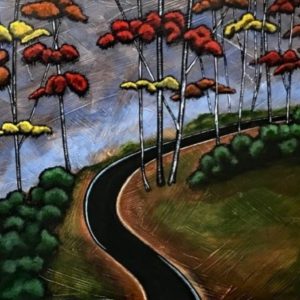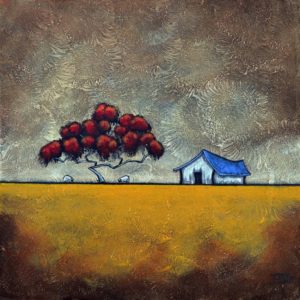A roadway in the wilderness is a gift to one coping with a challenging childhood or its lingering aftermath. I know. I survived a dysfunctional home through something resembling a miracle. Mercy is like a gift offering a way to a new life. A recent trip to Asheville provided much needed perspective.

Miles to Go, a painting by Philip D’Angelo
I’m visiting an art gallery in the River Arts District of Asheville with high school friends on Ground Hog Day when I’m drawn toward a painting on the wall. The small plaque beside the whimsical piece declares the painting is “Miles to Go” and is painted on Masonite. Masonite? I turn around to ask this one-word question of the artist Phillip DeAngelo. “Masonite?” He began to explain to me what Masonite board is. I took the first opportunity to politely hijack the discussion and proceed to tell him how, where, and by whom it was invented. And, for added color, I told him my father was employed in the office of the plant in Laurel, MS, I had attended William H. Mason Elementary School, and I had worked an internship in their lab while in college. And, finally, nearly out of breath, I volunteered that “Paneling” had hung in the family room of my childhood home. Masonite? A surface for art?
No object embodies my early years quite like Masonite – the particleboard commonly used for wall covering in the 1970s. Mason’s process takes wood fibers disintegrated by steam, drops them on a form, presses them with high temperature and force until the wood lignin within forms an adhesive to bind the fibers. A “natural” product formed by an extreme method. If the Masonite-paneled walls of my childhood home could talk, I think my siblings would race me back there to join in tearing them down. For many years, we were a family in survival mode. We experienced stress and temperature that pressed us into a rigid and unyielding shape. An invisible force blocked the conversion of lignin, though, because we never found the secret to sticking together – often turning on each other. And like Masonite, when exposed to outside weather and ageing, family ties and parts of ourselves were warped at best.
I’m not exactly sure what went wrong back then. I know it marked us, and we’ve all struggled differently to come to terms with those years. And, fittingly, on Ground Hog Day – the holiday that shares the name with and forms the backdrop for one of my favorite movies – I’m drawn back to understand a little more and try again to imagine what I would tweak to make it better if I had the gift of 100 mulligans, innumerable do overs to get it right. What would I change? And where was my roadway in the wilderness?
Expectations of our parents desperately needed recalibration. Doing the most they could with the little left over was the best those days would allow. They never really recovered from the jolt of five children born in six-and-a-half years starting nine months and a week from their wedding day. The stress of rearing, providing, disciplining, and launching took a toll on both of them in various ways.
Mercy needed liberal application. God and church were present – we attended faithfully and were made to watch Billy Graham crusades, partially as punishment, in an effort to find peace, acceptance, and intimacy. But there we still hung – sealed sides facing out – with vulnerable, real selves nailed shut and hidden away.
We never totally grasp the exact process of becoming who we are, do we? Yes, we are products of the extreme conditions we endure to form us. But we are no longer blank boards hanging side by side for appearance. We’re a repurposed canvas bearing brushstrokes from friendships, like those deepened over a weekend in Asheville; from experiences – bitter, sweet, and mingled; and from grace – desperately sought, lavishly extended.
Ground Hog Day is fiction. We’re allowed no do overs. In God’s wisdom, time is linear and one directional. He knows we haven’t the discernment to understand, much less fix, that which was lacking in the past. We can’t foresee the unintended consequences of an errant “tweak”. What we have is the capacity to marvel at art – a reflection of the divine intent of a Creator to redeem brokenness for His glory. And we’re given mercy to find a roadway in the wilderness to lead us home.

Homestead, painting by Philip D’Angelo
Do not call to mind the former things or ponder things of the past. Behold, I will do something new, now it will spring forth; Will you not be aware of it? I will even make a roadway in the wilderness, rivers in the desert. Isaiah 43:18
For more information on Philip D’Angelo Art, click here
Oh-to be able to “go back” and do over-not allowed. We only have today-the present-not past not future.
This is the day the Lord hath made-let us rejoice and be glad in it.
Thank you for sharing about Masonite. I’m glad you were able to connect with high school friends. I’m sure it brought back many memories just being together. ” A sweet friendship refreshes the soul.” Prov 27:9 (The Message)
Thank you for this Melissa. So true. Greer
So insightful!!! Thank you for sharing!!! What a gift of writing……just beautiful!!!
So true and powerful.
Oh my!!! I think I would for once be the winner of that race…the one to tear down those walls in more ways than one!!! You put into words so beautifully the pain of “our” story and even though there are no do-overs, like one of the comments above said, we have today, this day to change our course, to allow God to take the pain and regret of yesterday and start a “new” thing and open our eyes wide to see that road starting to appear and those rivers in the dessert starting to flow! I’m watching and waiting in anticipation of the “new” in my life! Thank you, my brilliant sister for helping me reflect back on our childhood, though sometimes painful, but mainly to see that repurposed Masonite and KNOW that HE is repurposing my life!